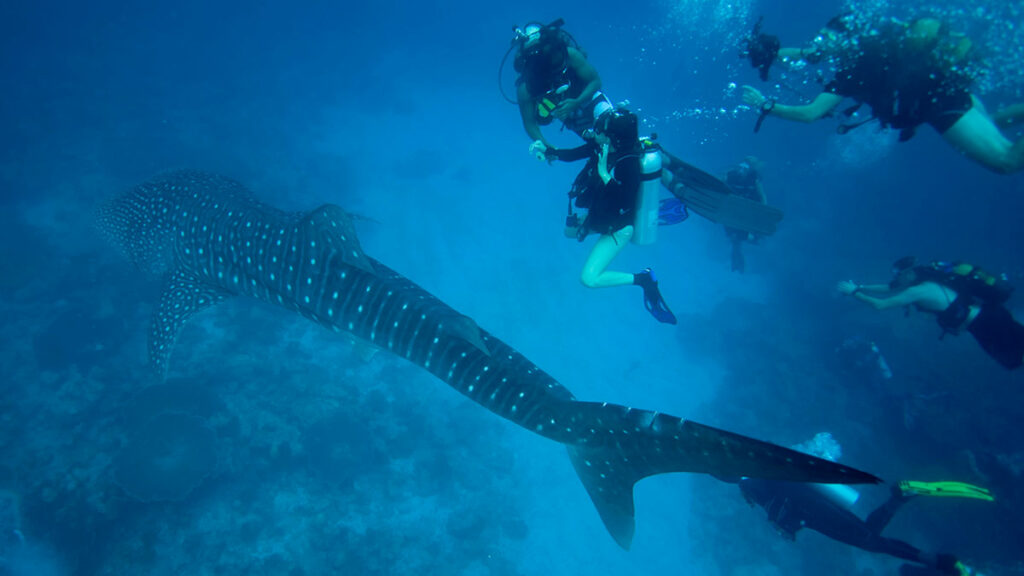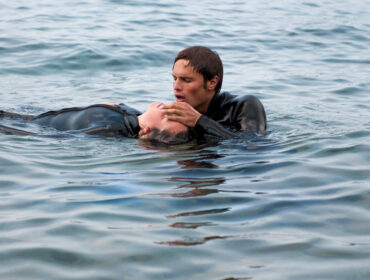There’s a good chance that you might have experienced a strange tilting, spinning, sometimes nauseating sensation while scuba diving. This is known as vertigo and is quite common among scuba divers. But when it comes to diving, it’s important to learn what causes and how to prevent vertigo when underwater.
In itself, vertigo is generally harmless, but it can sometimes lead to more serious issues underwater or be a symptom of a more serious medical condition. You may remember briefly learning about vertigo during your PADI Open Water Diver course. Let’s refresh ourselves on this often-overlooked safety issue.
What is vertigo and what causes it?
Vertigo is a dizzying sensation that can be quite anxiety-inducing as you feel like you’re not in control underwater. Some divers describe vertigo as feeling like the world is spinning, despite your body remaining still.
Vertigo and dizzy feelings are caused by an imbalance of pressure in the ears during descent, or more commonly, on ascent. The ears are usually the culprit when it comes to experiencing vertigo-like feelings underwater. If it’s not due to pressure variations between the two ears, the most common other cause of vertigo is an inner ear infection.
Besides ear issues, vertigo can also be triggered by disorientation. For example, when you’re diving in incredibly poor visibility, your brain can struggle to process the scene in front of you, making it difficult to orient yourself in the water, and causing confusion.
Finally, vertigo may also be a symptom of DCS, hypoxia, or a contaminated air fill.

How to prevent vertigo while scuba diving
There are several simple things that you can do to prevent vertigo during a dive – and most of these are just good diving practices!
Stay in shape for diving
Maintaining good physical health and not diving while sick is one of the easiest ways to avoid vertigo when diving. If you’re taking any medications, be sure to make your dive instructor or buddy aware. Some medication side effects may reveal themselves as vertigo-like symptoms while you’re under pressure during a scuba dive. And always make sure that you have a doctor’s clearance to dive.
Be a good buddy
Be sure to do a thorough buddy check before your dive. Take some breaths from your tank and make sure your air and your buddy’s tastes okay. If the air has an “oily” taste, you might have a bad air fill, which can lead to vertigo. Let a dive operator know ASAP. Staying close to your buddy underwater is also good practice. If something does happen underwater, you can help each other return safely to the surface.
Equalize air spaces regularly
As we discussed above, unequal air pressure can be a major cause of vertigo. Remember the basics: equalize early and often. If you’re diving with a hood, be sure it’s not interfering with equalization.
Use descent and ascent lines
Whenever available, use descent/ascent lines to avoid becoming disoriented underwater. This is especially important when diving in areas with low visibility or where there may be no other points of visual reference.

What to do if you experience vertigo
If you do find yourself suffering from vertigo while scuba diving, there are some things that you can do to treat it.
Remain calm
First and foremost, try to remain calm. Oftentimes, taking a pause to breathe deeply and relax can help your vertigo symptoms subside.
It’s also important to remember to resist the urge to pull out your regulator. Especially if you feel nauseous, you may have an impulse to remove your regulator to vomit. Doing this will result in you inhaling water and likely panicking underwater. Instead, if you really need to vomit, do it with your regulator in. Everything will be expelled through the exhaust valves.
Alert your buddy
Be sure to signal your buddy for help if you need assistance getting reoriented. If they’re close enough (like they should be!) your buddy should be able to help you gather your bearings again and hopefully ward off any feelings of dizziness. If your symptoms don’t subside, end the dive. Safely make your ascent to the surface, making sure to alert your buddy and use an ascent line if possible.
Consult your doctor
If you notice your vertigo symptoms consistently when diving, or continuing when you’re on land, consult your doctor. This may be a sign of an underlying medical condition.
Conclusion
Now that you understand the symptoms, how to prevent vertigo, and what to do if it does happen, you’ll be a much more prepared and safer diver in the water.






